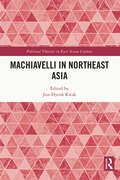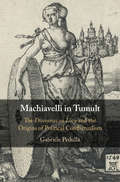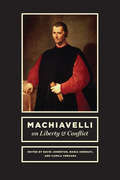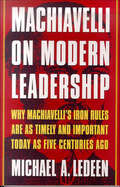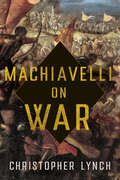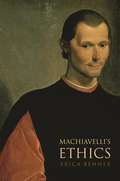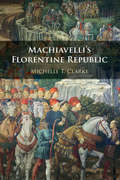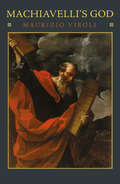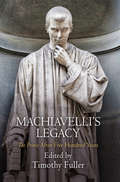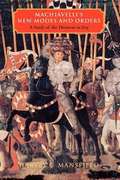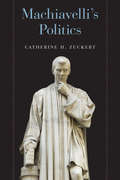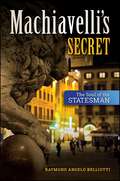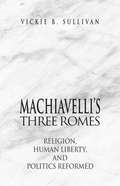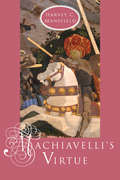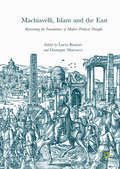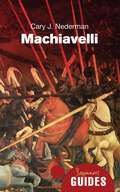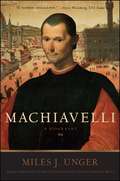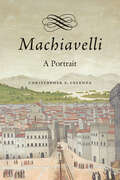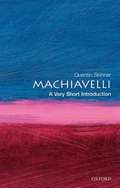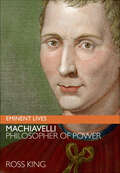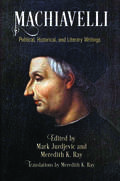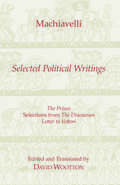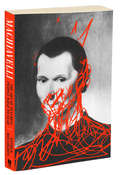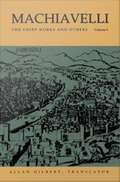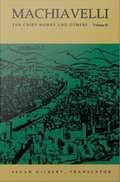- Table View
- List View
Machiavelli in Northeast Asia (Political Theories in East Asian Context)
by Jun-Hyeok KwakAnalyzing the multifaceted receptions of Machiavelli from early modernity to the present history of Northeast Asia, this book explores a better East-West dialogue through which Machiavelli’s political philosophy can be appropriated properly in Northeast Asian practices. First, comparing the receptions of Machiavelli in Europe with the early introduction of his texts in Northeast Asia, it investigates what has been missing from the reception of his ideas in Northeast Asia. Second, examining the imperative issues which haven’t been construed appropriately even in recent reinterpretations of Machiavelli’s political philosophy in Northeast Asia, it searches for a direction of East-West dialogue through which Machiavelli’s political philosophy is not inordinately contextualized within the sociopolitical demands of Northeast Asian societies in accordance with time and place. Third, given the continuing interest in Machiavelli’s political realism, it examines the different conjunctions of his political realism with diverse traditional and contemporary political thinking in Northeast Asia. This book will be attractive to scholars in political philosophy, history, political theory, comparative philosophy, and area studies focused on East Asia, as well as scholars working in the field of comparative literature.
Machiavelli in Tumult: The Discourses on Livy and the Origins of Political Conflictualism
by Gabriele PedullàAmong the theses that for centuries have ensured Niccolò Machiavelli an ambiguous fame, a special place goes to his extremely positive opinion of social conflicts, and, more in particular, to the claim that in ancient Rome 'the disunion between the plebs and the Roman senate made that republic free and powerful' (Discourses on Livy I.4). Contrary to a long tradition that had always highly valued civic concord, Machiavelli thought that - at least under certain conditions - internecine discord could be a source of strength and not of weakness, and built upon this daring proposition an original vision of political order. Machiavelli in Tumult (originally published in Italian in 2011) is the first book-length study entirely devoted to analyzing this idea, its ancient roots (never before identified), its enduring (but often invisible) influence up until the American and the French Revolution (and beyond), and its relevance for contemporary political theory.
Machiavelli on Liberty & Conflict
by Nadia Urbinati Camila Vergara David Johnston, Nadia Urbinati, and Camila VergaraMore than five hundred years after Machiavelli wrote The Prince, his landmark treatise on the pragmatic application of power remains a pivot point for debates on political thought. While scholars continue to investigate interpretations of The Prince in different contexts throughout history, from the Renaissance to the Risorgimento and Italian unification, other fruitful lines of research explore how Machiavelli’s ideas about power and leadership can further our understanding of contemporary political circumstances. With Machiavelli on Liberty and Conflict, David Johnston, Nadia Urbinati, and Camila Vergara have brought together the most recent research on The Prince, with contributions from many of the leading scholars of Machiavelli, including Quentin Skinner, Harvey Mansfield, Erica Benner, John McCormick, and Giovanni Giorgini. Organized into four sections, the book focuses first on Machiavelli’s place in the history of political thought: Is he the last of the ancients or the creator of a new, distinctly modern conception of politics? And what might the answer to this question reveal about the impact of these disparate traditions on the founding of modern political philosophy? The second section contrasts current understandings of Machiavelli’s view of virtues in The Prince. The relationship between political leaders, popular power, and liberty is another perennial problem in studies of Machiavelli, and the third section develops several claims about that relationship. Finally, the fourth section explores the legacy of Machiavelli within the republican tradition of political thought and his relevance to enduring political issues.
Machiavelli on Modern Leadership: Why Machiavelli's Iron Rules Are As Timely and Important Today As Five Centuries Ago
by Michael A. LedeenNiccolo Machiavelli, one of the eminent minds of the Italian Renaissance, spent much of a long and active lifetime trying to determine and understand what exceptional qualities of human character-- and what surrounding elements of fortune, luck, and timing-- made great men great leaders successful in war and peace.In perhaps the liveliest book on Machiavelli in years, Michael A. Ledeen measures contemporary movers and doers against the timeless standards established by the great Renaissance writer. Titans of statecraft (Margaret Thatcher, Francois Mitterrand, Pope John Paul II, Ronald Reagan, and Bill Clinton); business and finance (Bill Gates); Wall Street and investing (Warren Buffett); the military (Colin Powell), and sports (Michael Jordan) are judged by Machiavelli's precepts on leadership and the proper use of power. The result is a wide-ranging and scintillating study that illuminates the thoughts of the Renaissance master and the actions of today's truly towering figures as well as the character-challenged pretenders to greatness.Here is an exceptional book on Machiavelli and his ultra-realistic exploration of human nature-- then and now.
Machiavelli on War
by Christopher LynchMachiavelli on War offers a comprehensive interpretation of the philosopher-historian's treatment of war throughout his writings, from poems and memoranda drafted while he was Florence's top official for military matters to his posthumous works, The Prince and Discourses on Livy. Christopher Lynch argues that the issue of war permeates the form and content of each of Machiavelli's works, the substance of his thoughts, and his own activity as a writer, concluding that he was the first great modern philosopher because he was the first modern philosopher of war.Lynch details Machiavelli's understanding of warfare in terms of both actual armed conflict and at the intellectual level of thinkers competing on the field of knowledge and belief. Throughout Machiavelli's works, he focuses on how military commanders' knowledge of human necessities, beginning with their own, enables and requires them to mold soldiers, organizationally and politically, to best deploy them in operations attuned to political context and changing circumstances. Intellectually, leaders must shape minds, their own and others', to reject beliefs that would weaken their purpose; for Machiavelli, this meant overcoming the classical and Christian traditions in favor of a new teaching of human freedom and excellence. As Machiavelli on War makes clear, prevailing both on the battlefield and in the war of ideas demands a single-minded engagement in "reasoning about everything," beginning with oneself. For Machiavelli, Lynch shows, the successful military commander is not just an excellent leader but also an excellent human being in constant pursuit of the truth about themselves and the world.
Machiavelli's Ethics
by Erica BennerMachiavelli's Ethics challenges the most entrenched understandings of Machiavelli, arguing that he was a moral and political philosopher who consistently favored the rule of law over that of men, that he had a coherent theory of justice, and that he did not defend the "Machiavellian" maxim that the ends justify the means. By carefully reconstructing the principled foundations of his political theory, Erica Benner gives the most complete account yet of Machiavelli's thought. She argues that his difficult and puzzling style of writing owes far more to ancient Greek sources than is usually recognized, as does his chief aim: to teach readers not how to produce deceptive political appearances and rhetoric, but how to see through them. Drawing on a close reading of Greek authors--including Thucydides, Xenophon, Plato, and Plutarch--Benner identifies a powerful and neglected key to understanding Machiavelli. This important new interpretation is based on the most comprehensive study of Machiavelli's writings to date, including a detailed examination of all of his major works: The Prince, The Discourses, The Art of War, and Florentine Histories. It helps explain why readers such as Bacon and Rousseau could see Machiavelli as a fellow moral philosopher, and how they could view The Prince as an ethical and republican text. By identifying a rigorous structure of principles behind Machiavelli's historical examples, the book should also open up fresh debates about his relationship to later philosophers, including Rousseau, Hobbes, and Kant.
Machiavelli's Florentine Republic
by Michelle T. ClarkeWhat do modern republics have to fear? <P>Machiavelli's Florentine Republic reconstructs Machiavelli's answer to this question from the perspective of the Florentine Histories, his most probing meditation on the fate of republican politics in the modern age. It argues that his principle goal in narrating the defeat of Florentine republicanism is to debunk the views of leading humanists concerning the overall health of republican politics in modernity and the distinctive challenges that modern republics should expect to face. The Medici family had exposed these vulnerabilities better than anyone else, and Machiavelli reconstructs their political strategy to show how conventional ideas of moral and political virtue are the most potent instruments of princely ambition in a city that wants to be free.<P>Makes the Florentine Histories accessible to contemporary audiences interested in Machiavelli's political theory, and especially his republicanism.<P> Introduces readers to key examples of this primary source material,and offers extended comparative analyses with the Histories.<P> Highlights where and how Machiavelli is engaging with questions central to political theory, including those at the heart of The Prince and The Discourses.
Machiavelli's God
by Maurizio ViroliHow Machiavelli's Christianity shaped his political thoughtTo many readers of The Prince, Machiavelli appears to be deeply un-Christian or even anti-Christian, a cynic who thinks rulers should use religion only to keep their subjects in check. But in Machiavelli's God, Maurizio Viroli, one of the world's leading authorities on Machiavelli, argues that Machiavelli, far from opposing Christianity, thought it was crucial to republican social and political renewal—but that first it needed to be renewed itself. And without understanding this, Viroli contends, it is impossible to comprehend Machiavelli's thought.Viroli places Machiavelli in the context of Florence's republican Christianity, which was founded on the idea that the true Christian is a citizen who serves the common good. In this tradition, God participates in human affairs, supports and rewards those who govern justly, and desires men to make the earthly city similar to the divine one. Building on this tradition, Machiavelli advocated a religion of virtue, and he believed that, without this faith, free republics could not be established, defend themselves against corruption, or survive. Viroli makes a powerful case that Machiavelli, far from being a pagan or atheist, was a prophet of a true religion of liberty, a way of moral and political living that would rediscover and pursue charity and justice.The translation of this work has been funded by SEPS—Segretariato Europeo per le Pubblicazioni Scientifiche.
Machiavelli's Legacy
by Timothy FullerNiccolo Machiavelli's The Prince is one of the most celebrated and notorious books in the history of Western political thought. It continues to influence discussions of war and peace, the nature of politics, and the relation of private ethics to public duties. Ostensibly a sixteenth-century manual of instruction on certain aspects of princely rule and behavior, The Prince anticipates and complicates modern political and philosophical questions. What is the right order of society? Can Western politics still be the model for progress toward peace and prosperity, or does our freedom to create our individual purposes and pursuits undermine our public responsibilities? Are the characteristics of our politics markedly different, for better or for worse, than the politics of earlier eras? Machiavelli argues that there is no ideal, transcendent order to which one can conform, and that the right order is merely the one that has the capacity to persist over time. The Prince's emphasis on the importance of an effective truth over any abstract ideal marks it as one of the first works of modern political philosophy.Machiavelli's Legacy situates Machiavelli in general and The Prince in particular at the birth of modernity. Joining the conversation with established Machiavelli scholars are political theorists, Americanists, and international relations scholars, ensuring a diversity of viewpoints and approaches. Each contributor elucidates different features of Machiavelli's thinking, from his rejection of classical antiquity and Christianity, to his proposed dissolution of natural roles and hierarchies among human beings. The essays cover topics such as Machiavelli's vision for a heaven-sent redemptive ruler of Italy, an argument that Machiavelli accomplished a profoundly democratic turn in political thought, and a tough-minded liberal critique of his realistic agenda for political life, resulting in a book that is, in effect, a spirited conversation about Machiavelli's legacy.Contributors: Thomas E. Cronin, David Hendrickson, Harvey Mansfield, Clifford Orwin, Arlene Saxonhouse, Maurizio Viroli, David Wootton, Catherine Zuckert
Machiavelli's New Modes and Orders: A Study of the Discourses on Livy
by Harvey C. MansfieldMachiavelli's New Modes and Orders is the only full-length interpretive study on Machiavelli's controversial and ambiguous work, Discourses on Livy. These discourses, considered by some to be Machiavelli's most important work, are thoroughly explained in a chapter-by-chapter commentary by Harvey C. Mansfield, one of the world's foremost interpreters of this remarkable philosopher. Mansfield's aim is to discern Machiavelli's intention in writing the book: he argues that Machiavelli wanted to introduce new modes and orders in political philosophy in order to make himself the founder of modern politics. Mansfield maintains that Machiavelli deliberately concealed part of his intentions so that only the most perceptive reader could see beneath the surface of the text and understand the whole of his book. Previously out of print, Mansfield's penetrating study brings to light the hidden thoughts lurking in the details of the Discourses on Livy to inform and challenge its readers at every step along the way.
Machiavelli's Politics
by Catherine H. ZuckertMachiavelli is popularly known as a teacher of tyrants, a key proponent of the unscrupulous “Machiavellian” politics laid down in his landmark political treatise The Prince. Others cite the Discourses on Livy to argue that Machiavelli is actually a passionate advocate of republican politics who saw the need for occasional harsh measures to maintain political order. Which best characterizes the teachings of the prolific Italian philosopher? With Machiavelli’s Politics, Catherine H. Zuckert turns this question on its head with a major reinterpretation of Machiavelli’s prose works that reveals a surprisingly cohesive view of politics. Starting with Machiavelli’s two major political works, Zuckert persuasively shows that the moral revolution Machiavelli sets out in The Prince lays the foundation for the new form of democratic republic he proposes in the Discourses. Distrusting ambitious politicians to serve the public interest of their own accord, Machiavelli sought to persuade them in The Prince that the best way to achieve their own ambitions was to secure the desires and ambitions of their subjects and fellow citizens. In the Discourses, he then describes the types of laws and institutions that would balance the conflict between the two in a way that would secure the liberty of most, if not all. In the second half of her book, Zuckert places selected later works—La Mandragola, The Art of War, The Life of Castruccio Castracani, Clizia, and Florentine Histories—under scrutiny, showing how Machiavelli further developed certain aspects of his thought in these works. In The Art of War, for example, he explains more concretely how and to what extent the principles of organization he advanced in The Prince and the Discourses ought to be applied in modern circumstances. Because human beings act primarily on passions, Machiavelli attempts to show readers what those passions are and how they can be guided to have productive rather than destructive results. A stunning and ambitious analysis, Machiavelli’s Politics brilliantly shows how many conflicting perspectives do inform Machiavelli’s teachings, but that one needs to consider all of his works in order to understand how they cohere into a unified political view. This is a magisterial work that cannot be ignored if a comprehensive understanding of the philosopher is to be obtained.
Machiavelli's Secret: The Soul of the Statesman
by Raymond Angelo BelliottiThe political statesman, Machiavelli tells us, must love his country more than his own soul. Political leaders must often transgress clear moral principles, using means that are typically wrong, even horrifying. What sort of inner life does a leader who "uses evil well" experience and endure? The conventional view held by most scholars is that a Machiavellian statesman lacks any "inwardness" because Machiavelli did not delve into the state of mind one might find in a politician with "dirty hands." While such a leader would bask in his glory, the argument goes, we can only wonder at the condition of the soul they have presumably risked in discharging their duties. In Machiavelli's Secret, Raymond Angelo Belliotti uncovers a range of clues in Machiavelli's writings that, when pieced together, reveal that the Machiavellian hero most certainly has "inwardness" and is surely deeply affected by the evil means he must sometimes employ. Belliotti not only reveals the nature of this internal condition, but also provides a springboard for the possibility of Machiavelli's ideal statesman.
Machiavelli's Three Romes: Religion, Human Liberty, and Politics Reformed
by Vickie B. SullivanMachiavelli's ambiguous treatment of religion has fueled a contentious and long-standing debate among scholars. Whereas some insist that Machiavelli is a Christian, others maintain he is a pagan. Sullivan mediates between these divergent views by arguing that he is neither but that he utilizes elements of both understandings arrayed in a wholly new way. In this illuminating study, Sullivan shows Machiavelli's thought to be a highly original response to what he understood to be the crisis of his times.
Machiavelli's Virtue
by Harvey C. MansfieldUniting thirty years of authoritative scholarship by a master of textual detail, Machiavelli's Virtue is a comprehensive statement on the founder of modern politics. Harvey Mansfield reveals the role of sects in Machiavelli's politics, his advice on how to rule indirectly, and the ultimately partisan character of his project, and shows him to be the founder of such modern and diverse institutions as the impersonal state and the energetic executive. Accessible and elegant, this groundbreaking interpretation explains the puzzles and reveals the ambition of Machiavelli's thought. "The book brings together essays that have mapped [Mansfield's] paths of reflection over the past thirty years. . . . The ground, one would think, is ancient and familiar, but Mansfield manages to draw out some understandings, or recognitions, jarringly new."—Hadley Arkes, New Criterion "Mansfield's book more than rewards the close reading it demands."—Colin Walters, Washington Times "[A] masterly new book on the Renaissance courtier, statesman and political philosopher. . . . Mansfield seeks to rescue Machiavelli from liberalism's anodyne rehabilitation."—Roger Kimball, The Wall Street Journal
Machiavelli, Islam and the East
by Lucio Biasiori Giuseppe MarcocciThis volume provides the first survey of the unexplored connections between Machiavelli's work and the Islamic world, running from the Arabic roots of The Prince to its first translations into Ottoman Turkish and Arabic. It investigates comparative descriptions of non-European peoples, Renaissance representations of Muḥammad and the Ottoman military discipline, a Jesuit treatise in Persian for a Mughal emperor, peculiar readers from Brazil to India, and the parallel lives of Machiavelli and the bureaucrat Celālzāde Muṣṭaf#65533;. Ten distinguished scholars analyse the backgrounds, circulation and reception of Machiavelli's writings, focusing on many aspects of the mutual exchange of political theories and grammars between East and West. A significant contribution to attempts by current scholarship to challenge any rigid separation within Eurasia, this volume restores a sense of the global spreading of books, ideas and men in the past.
Machiavelli: A Beginner's Guide (Beginner's Guides)
by Cary J. NedermanMachiavelli has been among the most commented upon, criticized and feared thinkers of the modern world. Infamous for his support of brutality and repression as valid political instruments, he is often portrayed as the pantomime villain of political theorists. In this whirlwind tour of Machiavelli's writings and eventful life, Nederman highlights the complexities in his thought, highlighting that he advocated democracy as much as dictatorship, debate as much as violence, depending upon prevailing political conditions. Cary J. Nederman is professor of political science at Texas A&M University. He is the author of over twenty books on the history of Western political thought.
Machiavelli: A Biography
by Miles J. UngerHe is the most infamous and influential political writer of all time. His name has become synonymous with cynical scheming and the selfish pursuit of power. Niccolò Machiavelli, Florentine diplomat and civil servant, is the father of political science. His most notorious work, The Prince, is a primer on how to acquire and retain power without regard to scruple or conscience. His other masterpiece, The Discourses, offers a profound analysis of the workings of the civil state and a hardheaded assessment of human nature. Machiavelli’s philosophy was shaped by the tumultuous age in which he lived, an age of towering geniuses and brutal tyrants. He was on intimate terms with Leonardo and Michelangelo. His first political mission was to spy on the fire-and-brimstone preacher Savonarola. As a diplomat, he matched wits with the corrupt and carnal Pope Alexander VI and his son, the notorious Cesare Borgia, whose violent career served as a model for The Prince. His insights were gleaned by closely studying men like Julius II, the “Warrior Pope,” and his successor, the vacillating Clement VII, as well as two kings of France and the Holy Roman Emperor. Analyzing their successes and failures, Machiavelli developed his revolutionary approach to power politics. Machiavelli was, above all, a student of human nature. In The Prince he wrote a practical guide to the aspiring politician that is based on the world as it is, not as it should be. He has been called cold and calculating, cynical and immoral. In reality, argues biographer Miles Unger, he was a deeply humane writer whose controversial theories were a response to the violence and corruption he saw around him. He was a psychologist with acute insight into human nature centuries before Freud. A brilliant and witty writer, he was not only a political theorist but also a poet and the author of La Mandragola, the finest comedy of the Italian Renaissance. He has been called the first modern man, unafraid to contemplate a world without God. Rising from modest beginnings on the strength of his own talents, he was able to see through the pious hypocrisy of the age in which he lived. Miles Unger has relied on original Italian sources as well as his own deep knowledge of Florence in writing this fascinating and authoritative account of a genius whose work remains as relevant today as when he wrote it.
Machiavelli: A Portrait
by Christopher S. Celenza&“Explores why . . . The Prince . . . continues to enthrall readers and . . . can help enrich the way we understand [the statesman]. . . . A compelling portrait&” (Kirkus Reviews). The man whose name is shorthand for all that is ugly in politics was more nuanced than his reputation suggests. Christopher Celenza&’s portrait of Machiavelli removes the varnish to reveal not just the hardnosed philosopher but the skilled diplomat, learned commentator on ancient history, comic playwright, tireless letter writer, and thwarted lover. &“Machiavellian. The very word calls up images of plots, daggers and devious minds. Christopher Celenza separates the man from the melodrama.&” —Sydney Morning Herald &“Both readable and trustworthy.&” —Steve Donoghue, Open Letters Monthly &“Demonstrates how Machiavelli&’s thoughts on conflict and leadership are relevant to today&’s political world.&” —Choice &“By setting the author of The Prince in his historical context, Christopher Celenza captures the brilliance, risk-taking, danger, and sheer exuberant delight of the Italian Renaissance . . . Celenza enables us to seize upon what continues to be relevant in [Machiavelli&’s] work to our own time and place.&” —Stephen Greenblatt, Pulitzer Prize–winning author of The Swerve: How the World Became Modern &“Celenza&’s Machiavelli is a man passionately engaged in history, a scholar of the past whose interests run from the remote annals of ancient Rome to the tormented chronicles of early modern Italy, and an unflaggingly committed participant in the events of his own time. The result is a singularly humane portrait of a wise man making his way through what was often a cruel, chaotic world.&” —Ingrid Rowland, University of Notre Dame
Machiavelli: A Very Short Introduction
by Quentin SkinnerI think of Machiavelli essentially as the exponent of a neo-classical form of humanist political thought. I argue in addition that the most original and creative aspects of his political vision are best understood as a series of polemical -- sometimes even satirical -- reactions against the humanist assumptions he inherited and basically continued to endorse. While my principal aim has been to provide a straightforward introduction to Machiavelli's views on statecraft, I hope that this interpretation may also be of some interest to specialists in the field.
Machiavelli: Philosopher of Power (Eminent Lives)
by Ross KingNew York Times bestselling author Ross King’s biography Machiavelli is “a convincing portrait of one of the most misunderstood thinkers of all time.”*The author of The Prince—his controversial handbook on power, which is one of the most influential books ever written—Niccolò Machiavelli (1469–1527) was no prince himself. Born to an established middle-class family, Machiavelli worked as a courtier and diplomat for the Republic of Florence and enjoyed some small fame in his time as the author of bawdy plays and poems. In this discerning biography, Ross King rescues Machiavelli’s legacy from caricature, detailing the vibrant political and social context that influenced his thought and underscoring the humanity of one of history’s finest political thinkers.“Provides a strong sense of the history of both the man and his times and a nice introduction to Machiavelli’s writings. Moreover, like one of Machiavelli’s bawdy plays, it is a riveting and exhilarating read, full of salacious details and brisk prose.” —Publishers Weekly (Starred Review)“An engaging, revealing biography and a vivid portrait of a city-state in turmoil.” —Financial Times
Machiavelli: Political, Historical, and Literary Writings (Haney Foundation Series #13)
by Mark Jurdjevic Meredith K. RayThroughout his life, Niccolò Machiavelli was deeply invested in Florentine culture and politics. More than any other priority, his overriding central concerns, informed by his understanding of his city's history, were the present and future strength and independence of Florence. This volume highlights and explores this underappreciated aspect of Machiavelli's intellectual preoccupations.Transcending a narrow emphasis on his two most famous works of political thought, The Prince and the Discourses on Livy, Mark Jurdjevic and Meredith K. Ray instead present a wide sample of the many genres in which he wrote—not only political theory but also letters, poetry, plays, comedy, and, most substantially, history. Throughout his writing, the city of Florence was at the same time his principal subject and his principal context. Florentine culture and history structured his mental landscape, determined his idiom, underpinned his politics, and endowed everything he wrote with urgency and purpose.The Florentine particulars in Machiavelli's writing reveal aspects of his psyche, politics, and life that are little known outside of specialist circles—particularly his optimism and idealism, his warmth and humor, his capacity for affection and loyalty, and his stubborn, enduring republicanism. Machiavelli: Political, Historical, and Literary Writings has been carefully curated to reveal those crucial but lesser known aspects of Machiavelli's thought and to show how his major arguments evolved within a dynamic Florentine setting.
Machiavelli: Selected Political Writings
by Niccolo Machiavelli David WoottonHere are The Prince and the most important of the Discourses newly translated into spare, vivid English. Why a new translation? Machiavelli was never the dull, worthy, pedantic author who appears in the pages of other translations, says David Wootton in his Introduction. In the pages that follow I have done my best to let him speak in his own voice. (And indeed, Wootton's Machiavelli does just that when the occasion demands: renderings of that most problematic of words, virtu, are in each instance followed by the Italian). Notes, a map, and an altogether remarkable Introduction no less authoritative for being grippingly readable, help make this edition an ideal first encounter with Machiavelli for any student of history and political theory.
Machiavelli: The Art of Teaching People What to Fear
by Patrick BoucheronIn a series of poignant vignettes, a preeminent historian makes a compelling case for Machiavelli as an unjustly maligned figure with valuable political insights that resonate as strongly today as they did in his time. Whenever a tempestuous period in history begins, Machiavelli is summoned, because he is known as one for philosophizing in dark times. In fact, since his death in 1527, we have never ceased to read him to pull ourselves out of torpors. But what do we really know about this man apart from the term invented by his detractors to refer to that political evil, Machiavellianism?It was Machiavelli's luck to be disappointed by every statesman he encountered throughout his life—that was why he had to write The Prince. If the book endeavors to dissociate political action from common morality, the question still remains today, not why, but for whom Machiavelli wrote. For princes, or for those who want to resist them? Is the art of governing to take power or to keep it? And what is &“the people?&” Can they govern themselves? Beyond cynical advice for the powerful, Machiavelli meditates profoundly on the idea of popular sovereignty, because the people know best who oppresses them.With verve and a delightful erudition, Patrick Boucheron sheds light on the life and works of this unclassifiable visionary, illustrating how we can continue to use him as a guide in times of crisis.
Machiavelli: The Chief Works and Others, Volume 1
by Allan Gilbert Nicollò di Bernado dei MachiavelliIncludes:<P><P> * The Prince<P> * The Legations<P> * Discourses<P> * and more<P> From praise for the 1965 edition: Allan Gilbert is unquestionably the most accurate and reliable translator of Machiavelli into English; the publication of this edition is an altogether happy occasion. Students of the history of political thought owe a particular debt of gratitude to Allan Gilbert. "--Dante Germino, The Journal of Politics "A most remarkable achievement. "--Felix Gilbert, Renaissance Quarterly
Machiavelli: The Chief Works and Others, Volume II
by Allan Gilbert Nicollò di Bernado dei MachiavelliIncludes:<P><P> * The Life of Castruccio Castracani of Lucca, <P> * The Art of War<P> * Maciavelli's Comedies: Mandragoa and Clizia<P> * Carnival Songs<P> * Letter and more<P> From praise for the 1965 edition: Allan Gilbert is unquestionably the most accurate and reliable translator of Machiavelli into English; the publication of this edition is an altogether happy occasion. Students of the history of political thought owe a particular debt of gratitude to Allan Gilbert. "--Dante Germino, The Journal of Politics "A most remarkable achievement. "--Felix Gilbert, Renaissance Quarterly
